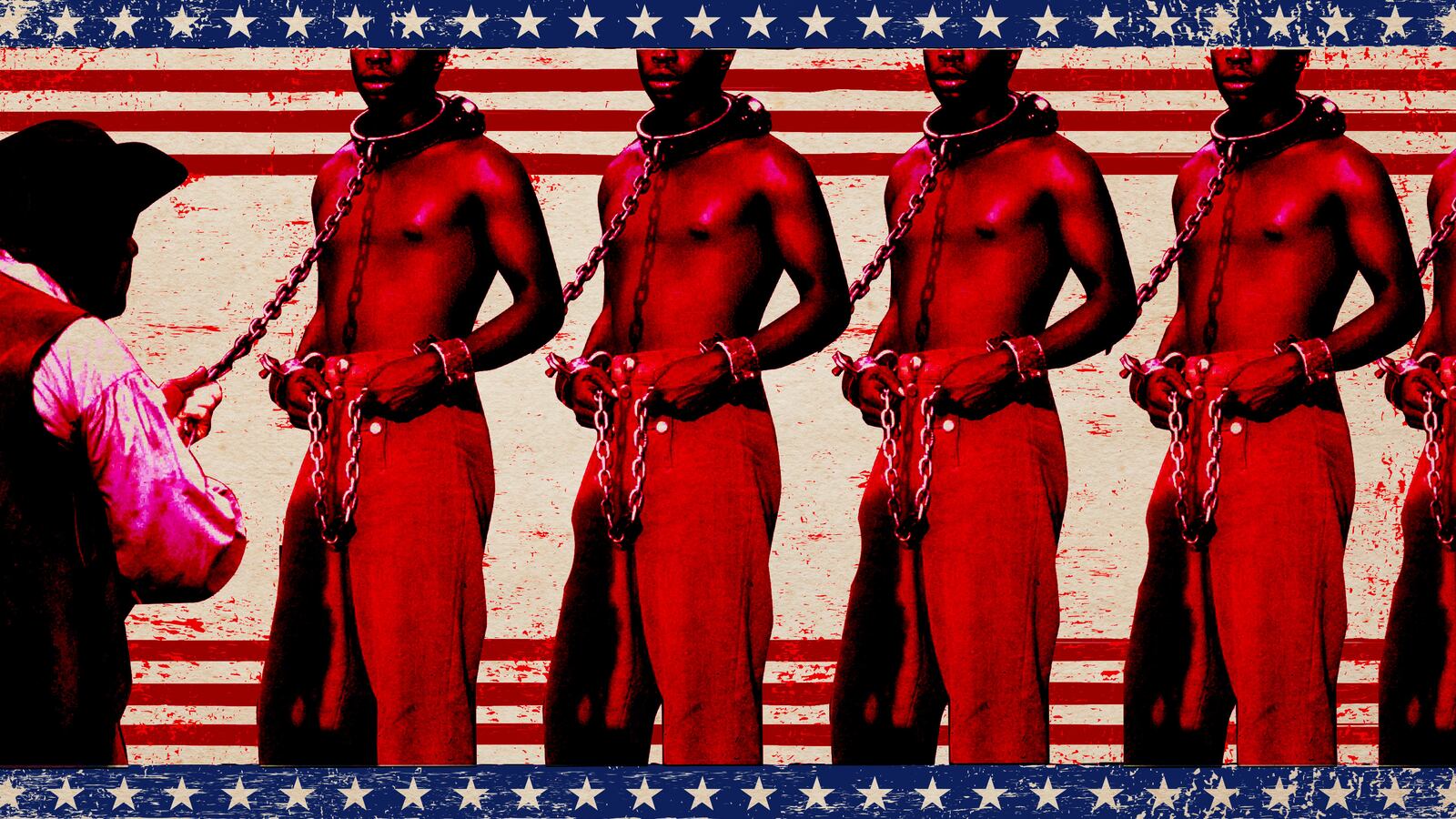I was taken by his smooth, leathery brown skin, his broad head covered in fine hair and the dimple in his chin. What I remember most is the slight smile, his kind, yet serious eyes. The formal military photograph, decades old by then and framed in silver, sat on a high shelf in the dining room, above the lace-topped Formica dining-room table. A photo of my brother Terrence, dressed in his stately blue Air Force uniform, stood next to it.
Between tending to his rose bushes and plucking mangoes from a tree out back, my grandfather Roy, a World War II veteran, would often start—though rarely finish—various family stories. Like clockwork, as another tale took flight, my grandmother Catherine—a diminutive creature with a booming voice—would set him right about the facts of the matter and conclude with her own flourishes. Grandpa Roy spoke little of his military service, and I remember just one family conversation he was part of that openly involved race.
There had been riots in Miami that year and the two of them barely made it through a throng of rock-throwing looters. It was 1980. In Grandma Cat’s telling, they came to a makeshift road block. White drivers were dragged from their cars and beaten. Black people were allowed to pass upon inspection. Quickly assessing the situation, Roy waved his clenched fist out the window. Catherine yanked it back, thrusting her own darker arm so the rioters could see it. “Your grandfather and his light-bright-almost-white behind nearly got us killed out there,” she said.
Roy shrugged. He didn’t like talking about that day. In fact, I can scarcely remember a foul word from him about anything really. He preferred Cardinals baseball and the pretty girls at a nearby bus stop above almost all else. For the most part, whatever his lot in this life, he had resigned himself to it. It should be said that Cat was the hero in nearly every story she ever told.
To the victor goes the spoils, according to the old adage. Among the lands and treasures taken as booty is also the pen that writes the story. To be sure, the history of this nation, from its birth to present day, has been written and sometimes rewritten at the pleasure and whim of its privileged class. The work of its Founding Fathers is held out as unimpeachably moral and courageous, in the name of perfecting this union.
That history, in that telling, has long been a cudgel of the conquerors and their descendants.
Even now, as The New York Times published The 1619 Project—a collection of essays meant to begin righting that history—a coterie of conservatives responded by evoking the grandeur of their own ideologically tainted narrative, to reduce any complicity in the blood and muck endured by the slaves and how mightily the country profited from that suffering. Led by former House Speaker Newt Gingrich, a history professor prone to rhetorical flourishes and racial bombast who once called for the return of orphanages for poor children, is now calling that American history unworthy of inspection lest it challenge their present station. It is easier, I imagine, to forget the plunder and malice, to forget the scourge of white supremacy.
Clearly, Gingrich had not read the work he was attacking. How else to explain his dismissal of a work that begins with a rejection of anti-American nihilism as “propaganda” designed to “brainwash” readers? In a Fox News segment, he complained that “several hundred thousand white Americans who died in the Civil War” were not given their due. The project, he complained, is a “lie” and is ultimately about impeaching Donald Trump. Others complained that by writing about slavery and its legacy, the paper of record aimed to delegitimize America, and further divide and demoralize its citizenry.
Such arguments are especially revealing. Representatives of the GOP, which has become the de facto party of White America, insists we must move beyond race with no recognition of how it continues to inform our modern-day politics. Those petty grievances, shared by many though certainly not all white Americans, reflect the extent to which African-American voices have been historically muted and erased in service of political power. For conservatives, it seems anything short of flag-waving patriotism does not merit publication. In their telling, to sully that history with the truth of our founding undermines our collective values and is nothing short of blasphemous.
Despite the soil tilled, the lashes endured and the industries built on slave labor, they believe their claim to the American story is absolute.
Every Fourth of July my late uncle proudly hoisted an American flag into its place on the center porch pillar. Albert Ross was a Korean War veteran, who lied about his age to join his brother in the Army. Is this not his America too? Is our story not theirs?
He was not alone in his service and sacrifice.
In my family there were also Navy petty officers, seamen, ensigns and lieutenants, several Army privates and a Marine lance corporal, serving at home and abroad. A Marine Corps private first class, my great aunt, was stationed at Quantico during World War II, while her husband and brother-in-law—one Marine, the other Army—wielded rifles on faraway battlefields. There is an Army command sergeant major and a Naval officer—both now retired and pursuing an advanced education. There is a soon-to-be PhD and two masters degrees among them, but most had little more—and sometimes less—than a high-school diploma. One of them had a voice so glorious he could have regaled audiences at Carnegie Hall. His son, a standout high basketball star with state titles under his belt, followed him into Army service and his daughter enlisted in the Air Force. I enlisted in the Marine Corps in 1987.
None of us was drafted.
This I know. The men and women in my family enlisted in the military out of love of country and the chance to fight for a liberty they did not always know at home. For some of them, like Ross and Roy, home was a place where voting, taking a seat at a lunch counter and failing to show an appropriate measure of respect could cost them their lives. Some, like my grandfather Reginald and aunt Juanita, were the sons and daughters of sharecroppers, washerwomen and porters. All were scions of slaves, human chattel in the same country to which they had given their blood and pledged their allegiance.
The elder among them served in segregated regiments. They were cooks, journalists, admins, medics, supply clerks, radio operators, fighter jet mechanics and infantrymen. All but two survived the beaches of Normandy, the mountains of Korea and the sands of Iraq—at least in body, if not always whole in spirit. But for this writing, their stories—and countless others—would go untold.
I think of them now—my grandfathers, uncles, cousins, nephews and brothers—their lives given as in the cause of other people’s freedom. I remember the array of framed photographs my Aunt Geraldine proudly hung in her living room and the others that stood on a high shelf in my grandmother’s home.
Lest I be mistaken, military service is not a requirement of patriotism, nor does hanging a flag outside one’s house it ensure it. But as Hannah Nicole Jones writes in introducing The 1619 Project, “Our founding ideals of liberty and equality were false when they were written. Black Americans fought to make them true.” That fight manifested itself on plantations and battlefields, in school rooms and courthouses. The fight to perfect this union crowded on to the Washington Mall, walked the Edmund Pettus Bridge and marched through the streets of Memphis. It prayed in the pews and shouted on the avenues, in a faith that one day we might recognize the original sin on which this nation was built and devote ourselves to living out, as Dr. King pronounced, “the true meaning of its creed: We hold these truths to be self-evident: that all men are created equal.”
To do so means to confront our history of exploitation and oppression. It means to pay homage and credence to the notion that no nation can call itself exceptional while rejecting its own history. The arrival of the first slaves in 1619, the inauguration of “a barbaric system of chattel slavery that would last for the next 250 years,” as Jones writes, is as much a part of that story as the first shots of the American Revolution.
That we, their descendants, would now raise our voices and our pens to tell that story and its consequences should be embraced.






